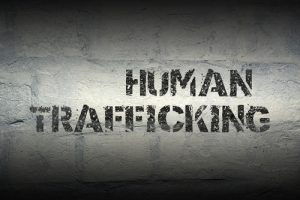
U.S. Rep. Brian Fitzpatrick (R-PA) on Jan. 8 sponsored bipartisan legislation to hit human traffickers where it hurts: in their bank accounts.
“Traffickers use the global financial system to launder their illicit funds,” Rep. Fitzpatrick said. “Cutting off their access to the banking system is critical to putting an end to their abhorrent crimes.”
Rep. Fitzpatrick introduced the End Banking for Human Traffickers Act, H.R. 295, with original cosponsors U.S. Reps. Michael McCaul (R-TX) and Bill Keating (D-MA) to increase the role of the financial industry in fighting human trafficking, according to the congressional record.
“Human trafficking continues to devastate millions of lives around the world,” Rep. Fitzpatrick said. “This criminal conduct may seem a distant problem, but it is not. It exists right here in our own backyards.”
The lawmaker noted that H.R. 295 “will not only bolster our efforts to prevent human traffickers from using our domestic financial system, it sends a signal around the world to cut off traffickers from the global financial system.”
Human traffickers earn $99 billion a year through sexual exploitation and make more than $150 billion annually in illegal profits from forced labor, according to estimates from the International Labor Organization.
“Unfortunately, human trafficking is a modern day form of slavery as profitable as it is despicable,” said Rep. McCaul, ranking member of the U.S. House Foreign Affairs Committee.
H.R. 295 would add financial intelligence and regulatory officers to the President’s Interagency Task Force to Monitor and Combat Trafficking in Persons, according to a summary provided by the congressman’s office, and would require the task force to make recommendations to both Congress and regulators toward improving anti-money laundering programs.
“With so many complex security and law enforcement challenges in human trafficking cases, one of the most straightforward ways to find traffickers is to follow the money,” Rep. Keating said. “By providing financial institutions and regulators with the resources and tools to better detect and prevent human trafficking, we will be opening another avenue for law enforcement to hold perpetrators of this heinous crime responsible.”
H.R. 295 also would permit advocates of trafficking victims to serve as “stakeholders” who could offer feedback to the U.S. Treasury Department and would specify that banks could not restrict trafficked victims access to bank accounts, according to Rep. Fitzpatrick’s summary.
“We know from our work providing victim advocacy and counseling to victims of human trafficking, that traffickers build their criminal enterprise at the dire cost of human lives,” said Penelope Ettinger, executive director of the Network of Victim Assistance, who supports H.R. 295. “Girls, women, boys and men are viewed by traffickers as highly valuable commodities, unlike weapons and the drug trade, because humans can be used over and over again for financial gain.”
In addition to Ettinger, the bill also has the support of Matthew Weintraub, Bucks County (Pa.) District Attorney; Tammy Oliver, executive director of A Woman’s Place; and Tam St.Claire, president emerita of the Women’s Advocacy Coalition. All are Bucks County constituents of Rep. Fitzpatrick.
H.R. 295 has been referred for consideration to both the House Foreign Affairs Committee and the U.S. House Financial Services Committee.



